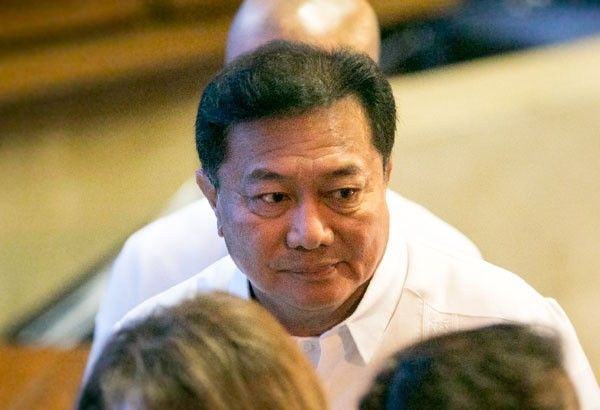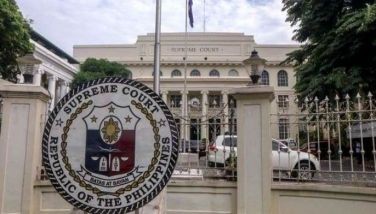Speaker Alvarez: ‘No-elections’ possible in 2019

Speaker Pantaleon Alvarez told ABS-CBN News Channel that rewriting the Constitution to change the system of government “from unitary to federal” is the top priority of Congress this year.
Palace: Only with Charter-change
MANILA, Philippines — A no-election scenario in 2019 is possible under a new Constitution shifting the nation to the federal system, Speaker Pantaleon Alvarez said yesterday.
The same scenario may apply to the election of President Duterte’s successor in 2022, said Senate President Aquilino Pimentel III.
Malacañang stressed that the midterm elections would be held as scheduled unless Charter change (Cha-cha) pushes through and the rewritten Constitution is ratified.
Alvarez told ABS-CBN News Channel that rewriting the Constitution to change the system of government “from unitary to federal” is the top priority of Congress this year.
He said the plan is for the House of Representatives and the Senate to convene as a constituent assembly or con-ass later this month to start working on the envisioned new Charter.
When asked if this could lead to a no-elections (no-el) scenario in 2019, Alvarez said, “I have to be frank, anything is possible. You know why? Let’s be practical. If you shift to a new system of government, you need a transition. You cannot implement it immediately after it is ratified.”
The nation elects new Congress members and local officials in 2019. Alvarez’s colleagues welcomed his statements on switching to federalism.
At Malacañang, presidential spokesman Harry Roque made it clear there will be elections in 2019 unless the 1987 Constitution is amended.
“All these positive developments mean that the process to shift to federalism is now in full throttle. Hopefully, federalism will achieve its goal of redistributing wealth to the countryside,” Camarines Sur Rep. Luis Raymund Villafuerte said.
He said Charter change (Cha-cha) should include removing foreign ownership restrictions in various sectors of the economy.
Lifting such restrictions is also the advocacy of several House members, including Feliciano Belmonte Jr. of Quezon City, Albee Benitez of Negros Occidental and Maximo Rodriguez Jr. of Cagayan de Oro City.
Another federalism proponent, Davao City Rep. Karlo Nograles, said he expects the people to approve the envisioned federal Constitution.
“Over 16 million Filipinos gave their stamp of approval to this endeavor when they elected President Duterte who has championed federalism since Day One,” he said.
In his television interview, Alvarez said con-ass should finish drafting the new Constitution before the barangay elections on May 8 this year so that the plebiscite for its ratification by the people could be held together with such village vote.
He said the scrapping of next year’s midterm polls could be part of the planned federal Charter’s transitory provisions.
He indicated that there could be a transition period of three years. “Remember that the term of office of 12 senators is expiring in 2019, while that of the other 12 ends in 2022. In fairness, it might be better if we can have their term of office expire at the same time in 2022,” he said.
Asked about the manner of voting in con-ass, he said, “The Constitution is silent on this, but for me, it is joint voting.”
However, he said if the Senate accepts joint voting, he expects it to be challenged before the Supreme Court.
Joint voting means the nearly 300 House members and 22 senators (Sen. Leila de Lima is detained, while one seat was vacated by Foreign Affairs Secretary Alan Peter Cayetano) would vote as one assembly on Cha-cha.
This was the manner of voting on the May 2017 martial law proclamation of President Duterte and its two extensions, though the Constitution is clear on the voting mode.
Several senators have said they would not agree to convene as a con-ass if the House would insist on joint voting since their votes would just be diluted, as in the voting on martial law. A con-ass resolution would have to be approved by the Senate.
Alvarez said senators could “run for President or whatever” under the envisioned federal Constitution.
Asked how he hoped to convince senators to cooperate in the Cha-cha effort despite his advocacy of joint voting in con-ass, he said he has ways of enticing them but refused to reveal them.
He said “personal interest” or prolonging the stay in office of incumbent House members and senators up to 2022 is “incidental” to revising the Charter and shifting the nation to the federal system.
“This is a question of patriotism. It’s what the country needs,” he said.
He added that he expected Pimentel to push Cha-cha for federalism “because it is a priority of President Duterte and of PDP-Laban.”
Pimentel is the ruling party’s president.
While Alvarez talked of a three-year transition to the federal system, other House members are mulling over a five-year term extension for lawmakers and two years for Duterte up to 2024.
Under this scenario, the elections next year and in 2022 would be scrapped to give way to a five-year transition to the envisioned new system of government and a five-year term of office for all elective officials. Thus, the first election under the planned new Charter would be held in 2024.
Will Duterte agree?
Pimentel said the possible extension of Duterte’s six-year term will really depend on whether he agrees to it or on what’s stipulated in the transitory provisions of the new constitution, assuming Congress finishes drafting it, and it gets ratified in a plebiscite in 2019.
“If (the new constitution is ratified) in 2019 then the next three years will be the transitory period. We can extend the President’s term, if really necessary, and if he is amenable to it,” Pimentel said.
“And since that extension will be part of the new constitution, the new constitution is approved by the people themselves,” he told reporters.
He, however, stressed the possible extension of Duterte’s stay in power was not a consequence or the objective of the PDP-Laban’s effort to amend the Constitution.
He said the proposed change to a federal form of government could still be pursued without scrapping the presidential and national elections in 2022 as set by the Constitution.
“That is not an ‘either/or’ situation. We can shift to federalism and allow all scheduled elections under the existing Constitution to go on and be held,” Pimentel pointed out.
He said what is important are the transitory provisions that would govern the terms and duties of those elected in the last elections under the 1987 Constitution.
“And before we can operate under a new constitution, the provisions of the existing Constitution must be followed. Hence, if there are scheduled elections under the existing Constitution, then this must be followed,” he said.
Pimentel also bristled at Alvarez’s chiding the Senate for being too slow in passing urgent legislation, reiterating that the chamber was the “studious House.”
He said it was natural for the House of Representatives to churn out more legislation as “local bills” such as those renaming and/or merging schools, increasing hospital beds, emanate from it.
“But we must all change our mindset – from quantity to quality. Let us not judge lawmaking in terms of number of laws passed but in terms of how the laws we pass improve the quality of life on earth in general and the quality of life of Filipinos in particular. Again I say: change mindset. Quality not quantity.”
Amid suspicion sparked by Cha-cha efforts in Congress, Roque cited the current Constitution’s importance to Duterte.
“The President always looks to the Constitution as his guiding document. The Constitution sets the date for the next elections in 2019. So unless the Constitution is amended ahead of the 2019 elections, it will have to push through,” he said.
“The role of the President is to implement the Constitution and the law. As I said, it is the Constitution that sets when the next election is,” he added.
Roque also claimed the President is not in favor of efforts of his lawmaker-allies to extend his term.
“I can categorically state that PRRD (Duterte’s initials) does not want that. He wants to cut short his term rather than lengthen it,” he added.
‘Immoral’
Senate Minority Leader Franklin Drilon of the Liberal Party (LP) said the statements of Pimentel and Alvarez only confirmed suspicions regarding their true motive in their push for federalism.
“The cat is out of the bag! At least, the real purpose of federalism is out – term extension. LP will oppose such immoral proposition,” Drilon said in a text message.
“It reveals the true intentions of the Duterte administration to perpetuate themselves in power. It speaks volumes of how they have arrogated power unto themselves and instilled fear upon the people who oppose their position,” Akbayan Rep. Tom Villarin said.
On New Year’s Eve, the LP warned that “lies” peddled by the administration in 2017 would continue to be mouthed this year as it urged Filipinos to remain vigilant and oppose any attempt at term extension.
“How will the lies be promoted in 2018? By circumventing, if not actually violating, the country’s fundamental law through Cha-cha (Charter change) or federalism or martial law so that some politicians can try to rule longer than allowed and that we the people won’t be allowed to choose our leaders,” the LP said in a statement last Dec. 31.
LP president Sen. Francis Pangilinan said Congress may not be trusted in the task of amending the Constitution.
He said the dismal record of the administration-controlled Congress can be seen in the way it handled the various scandals and national issues affecting the administration, including the drug-related extrajudicial killings, the impeachment proceedings against Chief Justice Ma. Lourdes Sereno, the one-year extension of martial law and the slashing of the budget of the Commission on Human Rights to P1,000.
Sen. Panfilo Lacson said amending the Constitution and the shift to federalism was “easier said than done,” especially with the PDP-Laban’s timeline of conducting a plebiscite in May this year.
Meanwhile, the Commission on Elections (Comelec) said it is confident there will be enough service providers to supply its needs despite the postponement of the barangay and Sangguniang Kabataan (SK) polls in 2016 and 2017.
“There are no concerns about lack of bidders, there is no foreseen shortage of companies willing to bid,” Comelec spokesman James Jimenez said. – Alexis Romero, Sheila Crisostomo
- Latest
- Trending






























